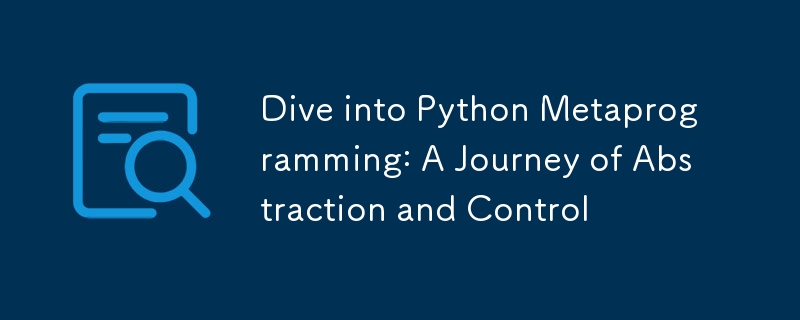Home >Backend Development >Python Tutorial >Dive into Python Metaprogramming: A Journey of Abstraction and Control
Dive into Python Metaprogramming: A Journey of Abstraction and Control
- WBOYWBOYWBOYWBOYWBOYWBOYWBOYWBOYWBOYWBOYWBOYWBOYWBforward
- 2024-02-19 20:15:021181browse

Introduction to Python Metaprogramming pythonYuanProgramming is a powerful feature of the Python language that allows programmers to create and modify classes at runtime. This makes Python a very flexible language, as it allows programmers to create and modify its behavior at runtime. This is useful in many situations, for example when you need to create temporary classes or dynamically generate code.
Application scenarios of Python metaprogramming
Python metaprogramming has a wide range of application scenarios, including but not limited to:
- Create dynamic class
- Modify class behavior
- Metaclass Programming
- Decorator
- Generic programming
- Dynamic code generation
Advantages of Python metaprogramming
Python metaprogramming has the following advantages:
- Improved code reusability
- Enhanced code scalability
- Improved code maintainability
- Improved code flexibility
Limitations of Python metaprogramming
Python metaprogramming also has some limitations, including but not limited to:
- Increased code complexity
- Increases the difficulty of debugging the code
- It may lead to poor readability of the code
Introduction to Python Metaprogramming
To start using Python metaprogramming, you need to understand the following concepts:
- kind
- Object
- Metaclass
- Decorator
- Dynamic code generation
The following is some sample code for Python metaprogramming:
# 创建一个元类
class Meta(type):
def __new__(cls, name, bases, dct):
print("Creating a new class!")
return super().__new__(cls, name, bases, dct)
# 创建一个使用元类的类
class MyClass(metaclass=Meta):
pass
# 创建一个MyClass对象
obj = MyClass()
In this example, we create a metaclass called Meta, which overrides the class creation process. When we create the MyClass class, the Meta metaclass is used to create the class and print a message. Then, we created a MyClass object and printed its type.
Advanced topics in Python metaprogramming
Once you have mastered the basics of Python metaprogramming, you can start exploring more advanced topics such as:
- Create dynamic classes using metaclasses
- Use decorators to modify class behavior
- Create reusable code using generic programming
- Create dynamic programs using dynamic code generation
Summarize
Python metaprogramming is a powerful feature of the Python language that allows programmers to create and modify classes at runtime. This makes Python a very flexible language, as it allows programmers to create and modify its behavior at runtime. While Python metaprogramming has many advantages, it also has some limitations. If you want toLearnPython metaprogramming, you need to understand concepts such as classes, objects, metaclasses, decorators, and dynamic code generation. Once you master these basics, you can start exploring more advanced topics such as using metaclasses to create dynamic classes, using decorators to modify class behavior, using generic programming to create reusable code, and using dynamic code generation to create dynamic programs.
The above is the detailed content of Dive into Python Metaprogramming: A Journey of Abstraction and Control. For more information, please follow other related articles on the PHP Chinese website!

